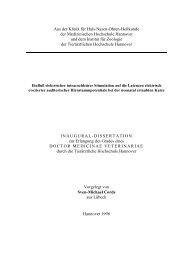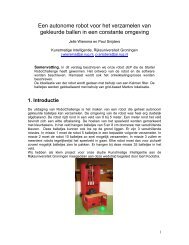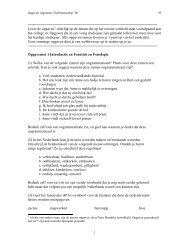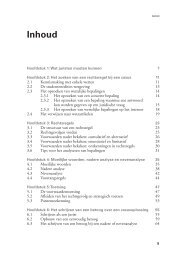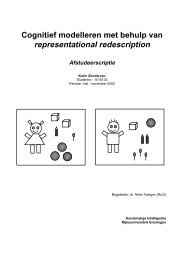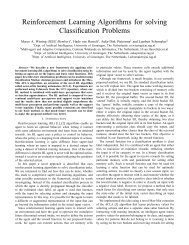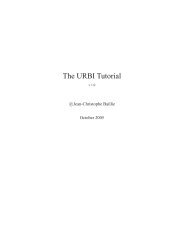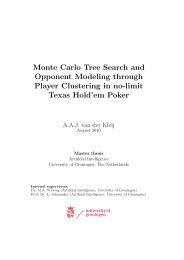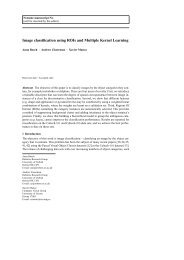Presuppositions in Spoken Discourse
Presuppositions in Spoken Discourse
Presuppositions in Spoken Discourse
You also want an ePaper? Increase the reach of your titles
YUMPU automatically turns print PDFs into web optimized ePapers that Google loves.
Accommodation and Presupposition<br />
5.1.3 Intermediate and Local Accommodation<br />
For the majority of the examples that were accommodated locally or <strong>in</strong>termediately,<br />
global accommodation was ruled out either because it would be epistemically<br />
<strong>in</strong>defensible or because a discourse referent with<strong>in</strong> the embedded context is either<br />
explicitly or implicitly referred to <strong>in</strong> the presuppositional expression, i.e. cases of<br />
trapp<strong>in</strong>g.<br />
It was mentioned <strong>in</strong> section 2.4 that the satisfaction theory has difficulties<br />
represent<strong>in</strong>g <strong>in</strong>termediate accommodation. If corpus l<strong>in</strong>guistic evidence shows that<br />
we need a concept of <strong>in</strong>termediate accommodation to correctly <strong>in</strong>terpret naturally<br />
produced examples, we would have an additional argument for preferr<strong>in</strong>g the<br />
b<strong>in</strong>d<strong>in</strong>g theory. In order for <strong>in</strong>termediate accommodation to be a potential<br />
<strong>in</strong>terpretation the utterance conta<strong>in</strong><strong>in</strong>g the trigger will need to have at least three<br />
contexts to accommodate <strong>in</strong>.<br />
Unfortunately, <strong>in</strong> many complex cases it is difficult to determ<strong>in</strong>e if and<br />
where embedded contexts beg<strong>in</strong> and end. This made it difficult not only to<br />
determ<strong>in</strong>e if <strong>in</strong>termediate accommodation was possible but also to determ<strong>in</strong>e what<br />
the mean<strong>in</strong>g of each read<strong>in</strong>g would be at each potential level of accommodation<br />
with the different embedded contexts. Therefore I was unable to evaluate this claim<br />
<strong>in</strong> relation to the corpus data. Additionally, it does not seem very mean<strong>in</strong>gful<br />
beyond the level of <strong>in</strong>dividual examples to know frequencies for <strong>in</strong>termediate<br />
accommodation contrasted with local accommodation. The important question<br />
about the behavior of presuppositions under embedd<strong>in</strong>g has to do with global<br />
versus <strong>in</strong>termediate or local accommodation, but it is not important for these<br />
discussions how deep <strong>in</strong> the embedd<strong>in</strong>g accommodation actually was.<br />
The follow<strong>in</strong>g example is representative of about half of the locally<br />
accommodated factives. Only global and local accommodation are options because<br />
it is clear that there is only one logical operator creat<strong>in</strong>g a level of embedd<strong>in</strong>g, the<br />
negation.<br />
(4) factive, triggered p: I am go<strong>in</strong>g to be a vast amount of help to you (LOCAL)<br />
(2-2a 16)<br />
Speaker A: But I don‘t really know that I‘m go<strong>in</strong>g to be a vast amount of help to you.<br />
The <strong>in</strong>duced presupposition here is “I am go<strong>in</strong>g to be a vast amount of help to<br />
you.” This is embedded under negation. Global accommodation would result <strong>in</strong> the<br />
speaker presuppos<strong>in</strong>g that he is go<strong>in</strong>g to be a vast amount of help but then deny<strong>in</strong>g<br />
know<strong>in</strong>g about this. This analysis is epistemically <strong>in</strong>defensible; the speaker cannot<br />
presuppose a fact that he then denies know<strong>in</strong>g about. Therefore we must locally<br />
accommodate <strong>in</strong> the negated context. There were 5 cases of this specific structure<br />
among the factives, all examples where the subject of the matrix sentence is the<br />
speaker, and the matrix sentence is a present tense negated factive verb. This type<br />
of example is also well known from the theoretical literature (see Gazdar (1979),<br />
Kiparsky & Kiparsky (1970)). In order to correctly analyze them we need to add a<br />
105



